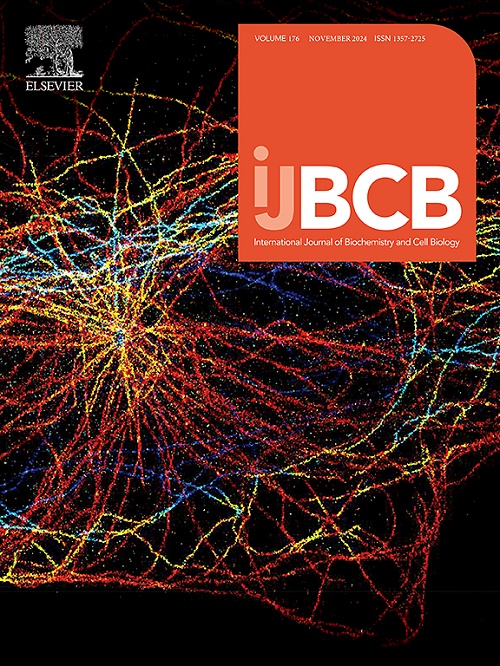Sepsis impairs immunocompetent plasmacytoid dendritic cell reconstitution from hematopoietic stem/progenitor cell through altered bone marrow environment
IF 2.8
3区 生物学
Q2 BIOCHEMISTRY & MOLECULAR BIOLOGY
International Journal of Biochemistry & Cell Biology
Pub Date : 2025-06-19
DOI:10.1016/j.biocel.2025.106823
引用次数: 0
Abstract
Plasmacytoid dendritic cells (pDCs) are crucial components of the immune response during viral infections, yet their function and development in the late phase of sepsis remain poorly understood. In this study, we investigated the impact of prolonged sepsis on pDCs and their progenitors in cecal ligation and puncture (CLP)-induced septic mice. We observed a significant reduction in both pDCs and their progenitors, alongside the presence of mature and regulatory pDCs. These mature and regulatory pDCs exhibited impaired type I interferon (IFN) secretion and antigen presentation capacity. In a Flt3L culture system of hematopoietic stem/progenitor cells (HSPCs) from CLP and Sham mice, we found that CLP-derived HSPCs exhibited an impaired ability to generate immunocompetent pDCs, as evidenced by lower IFN-α expression and reduced pDC recovery. Further investigation revealed downregulation of the key transcription factor TCF4 during pDC differentiation in these progenitor cells. Ectopic expression of TCF4 in these progenitors restored pDC generation. Additionally, we observed elevated levels of granulocyte colony-stimulating factor (G-CSF) in the bone marrow supernatant of septic mice. The addition of G-CSF to the culture system significantly impaired the generation of immunocompetent pDCs from HSPCs of normal mice. These findings suggest that sepsis may impair the production of immunocompetent pDCs from HSPCs by modulating key genes involved in pDC differentiation, potentially contributing to immune suppression and increased susceptibility to opportunistic infections in the later stages of sepsis.
脓毒症通过改变骨髓环境损害造血干细胞/祖细胞的免疫能力浆细胞样树突状细胞重建。
浆细胞样树突状细胞(pDCs)是病毒感染期间免疫反应的重要组成部分,但其在败血症晚期的功能和发育尚不清楚。在这项研究中,我们研究了长期脓毒症对盲肠结扎和穿刺(CLP)诱导的脓毒症小鼠pDCs及其祖细胞的影响。我们观察到pDCs及其祖细胞的显著减少,以及成熟和调节性pDCs的存在。这些成熟的调节性pDCs表现出I型干扰素(IFN)分泌和抗原递呈能力受损。在CLP和Sham小鼠造血干细胞/祖细胞(HSPCs)的Flt3L培养系统中,我们发现CLP衍生的HSPCs产生免疫活性pDCs的能力受损,IFN-α表达降低,pDC恢复减少。进一步的研究发现,在这些祖细胞的pDC分化过程中,关键转录因子TCF4下调。TCF4在这些祖细胞中的异位表达恢复了pDC的生成。此外,我们观察到脓毒症小鼠骨髓上清液中粒细胞集落刺激因子(G-CSF)水平升高。在培养系统中加入G-CSF可显著抑制正常小鼠HSPCs产生具有免疫能力的pDCs。这些发现表明,脓毒症可能通过调节参与pDC分化的关键基因,损害HSPCs产生具有免疫能力的pDC,可能导致脓毒症后期免疫抑制和增加对机会性感染的易感性。
本文章由计算机程序翻译,如有差异,请以英文原文为准。
求助全文
约1分钟内获得全文
求助全文
来源期刊
CiteScore
8.10
自引率
0.00%
发文量
124
审稿时长
19 days
期刊介绍:
IJBCB publishes original research articles, invited reviews and in-focus articles in all areas of cell and molecular biology and biomedical research.
Topics of interest include, but are not limited to:
-Mechanistic studies of cells, cell organelles, sub-cellular molecular pathways and metabolism
-Novel insights into disease pathogenesis
-Nanotechnology with implication to biological and medical processes
-Genomics and bioinformatics

 求助内容:
求助内容: 应助结果提醒方式:
应助结果提醒方式:


